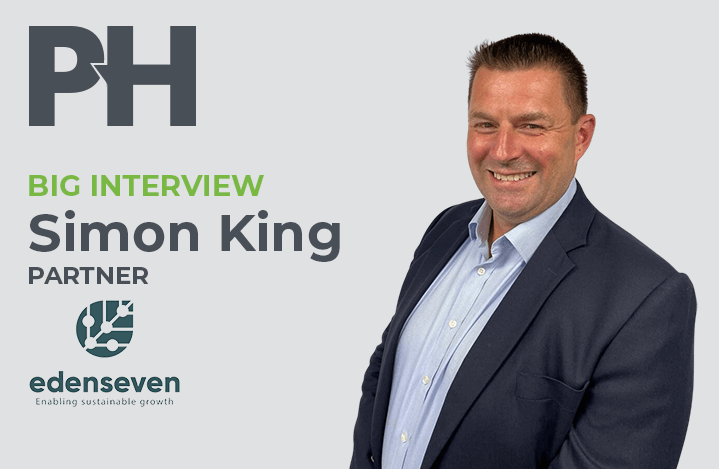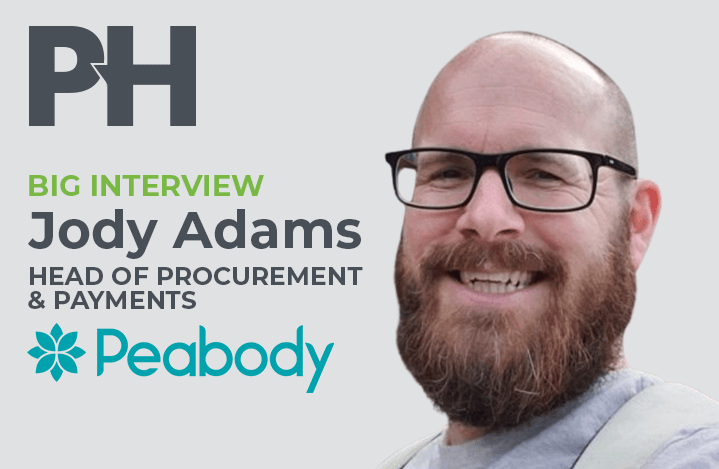Could you tell us a bit about your background?
I am currently a partner at Edenseven, a consultancy based on delivering business performance through sustainability, but my background is as a Procurement Director and Global CPO.
I first moved into procurement at Coca-Cola and ended up leading the strategic procurement team there, I was then Group Procurement Director for Dairy Crest before moving to become Global CPO for Tata Global Beverages.
I then went on to Mitie, the UK’s largest facilities management business, initially looking after fleet and procurement there before picking up the sustainability and social value elements.
I started off as an analytic chemist way back when, I never thought I would be doing what I am now!
When did your interest in supply chain management and procurement start?
To be honest, it wasn’t a thing I grew up wanting to do.
I joined Coca-Cola and did all sorts of different roles, selling into corner shops, learning and development roles, and operational roles and I ended up in accounts looking after contract caterers.
I was approached about joining the indirect procurement team that Matt Swindall, who is now the CPO at Britvic, was setting up at Coke.
The reason he approached me, amongst others, was that he was looking for three things: procurement experts, subject matter experts and commercial experts and given my background in national accounts and commercial training he put me in that last bracket.
I’m not sure I’ve ever been fully comfortable with being a commercial expert, but that is where it came from!
It was an exciting area, to be honest, it was a completely different area to the one I had been in before in supply chain.
I ended up being responsible for all of the capital and MRO buying across the factories. I had only been in a factory once and knew nothing about procurement, so it was a learning curve but a fantastic opportunity.
Matt is a hugely capable and inspirational guy and I learned loads from him and the procurement team, I saw the impact you could make, both from the bottom-line savings point of view and also the access and contacts you had to senior people across the business.
One of the things I love about procurement is you tend to be talking to people who are two or three levels of hierarchy above you – whatever your role is – and that is a pretty unique position, so that is where it started.
How does it feel to be driving a sustainability agenda through that knowledge you built up?
It is fantastic, it is absolutely great.
I have spent a long-time saying procurement is about adding value not cost and now there is a chance to really show that in a truly meaningful way.
Sustainability done well drives business performance in every single way.
It drives profit, it drives people and engagement and drives the planet’s outcomes as well.
It is a fantastic space to be in and for those in procurement who genuinely believe that we are not just cost monkeys, we are here to deliver the broader value proposition.
Sustainability has to be at the core of that.
I love it, it is a wonderful space to be in.
What triggered your move to sustainability?
I think there were three things, one is sustainability is where procurement was 15/20 years ago in that some of the leading organisations had started to do it, but it wasn’t fully embedded across the board but there was a huge opportunity to make a difference and of course that is still true in procurement.
Sustainability was almost the new frontier which I find interesting, I have done procurement transformations in my leadership roles primarily so I enjoy that.
Also, I think the realisation of how much impact this can have, and that is on a company’s top and bottom line as well as all of the other aspects, again in the way that procurement still can do but certainly was doing to a greater extent in the earlier days.
The last thing is needing to take action, one of the lines I constantly use is ‘You don’t have to care about sustainability, you only have to care about it if you love your children and your grandchildren’ we are leaving this planet to them.
My eldest son is 18, so hopefully I’m a way off having grandchildren, but even if you have a kid who is born today they are almost certainly going to be living way into the 2100s and if we don’t do something that is going to be a challenging place to live, so for all of those reasons sustainability is critical.
What are the biggest obstacles procurement needs to overcome to make a big impact?
I think the main one is a lack of understanding of the impact it has inside one’s own business and through the supply chain.
I think it is still seen in lots of businesses as compliance, something you have to do which is a bit of a pain but you have to do it.
But if you can understand and grasp the scale of opportunity that exists and explain that to stakeholders from the board to the CEO and CFO to the employees across your organisation then you can make really meaningful progress in all aspects of business performance.
It is not core to what a lot of people have grown up understanding, but it needs to be now.
I think that gap in knowledge and understanding is the biggest challenge.
How do you think procurement and supply chain managers perceive sustainability and ESG?
I am not known for mincing my words, so I would say that most see it as a bit of a pain.
Maybe the more enlightened see it as a nice to do and then of course there are some that are fully embracing this.
There was a survey done when I was at Mitie and it was quite enlightening, across huge organisations about 50% of those businesses had targets in the sustainability arena but only half of that group had a plan to actually deliver them.
That is business as a whole rather than just procurement, but I think it shows the level of maturity in this space so that is what I would say.
Why is it important for procurement to keep banging that drum?
I would say procurement wants to focus on far more than just price, it’s talking about value and some of the key elements, especially in the pandemic and so on recently.
Clearly, cost is a key component, but so is the security of supply chain and so are things like brand image and corporate reputation and all of those are tied up with sustainability.
If you are not delivering on the social value sides of ESG then there is a real risk to your brand image.
If you are not considering how structures are working then you have risks to your supply chain and if organisations aren’t taking action on sustainability on your supply chain, then costs are going to be higher as well.
Even if you are just doing it for procurement reasons then those are good reasons to do it and then if you step up a level to the board and to the C-suite then if you want to drive business performance, sustainability allows you to drive profit, it increases core revenue and reduces your costs.
It allows you to engage effectively with people whether that is clients, investors, employees or regulators they all want that.
It is absolutely fundamental that people integrate sustainability into business strategy and if you aren’t then you are leaving money on the table as a business.
I hear a lot of people saying it is too expensive to go sustainable. Do you find yourself having more conversations to combat that or less now?
I think it is still a widely held perception, some people are getting it.
Without entering the political realm too much I think some of the conversations we have seen in recent weeks about the cost of net zero show how far we have got to go.
I quite regularly get people saying it is too expensive, but I tend to go for an approach something along the lines of ‘Where did you learn maths?’ It just doesn’t make sense.
I will give you a couple of examples, if you drive the average diesel car in the UK that averages about 43 miles per gallon and costs in fuel about 21p per mile.
If you have an electric car, which you charge on overnight tariffs that cost can be below 2p per mile, so a tenth of the cost.
There is a massive saving there and people say they’re expensive to buy but yet 70% of vehicles sold this year into business and fleet have had an internal combustion engine, it is ridiculous.
Then if you look at electricity, the LCOE (levelised cost of energy) is about $50 a megawatt hour $56 for solar and utility-scale then it is $71 for gas and $88 for coal is actually wind and solar are much cheaper.
So, if you were just doing your normal sourcing process, if you end up with anything other than the zero-carbon answer you’ve got it wrong.
It is simply not true that sustainability is more expensive.
That is just cost not even revenue and increasing price, all of that you can do as well.
What do you think the future is of sustainability in the procurement realm?
Even if it is cost cost cost I have just gone through the financial examples, so if all you care about is savings, if you are not doing this stuff, you are missing a massive opportunity.
Then as you get more mature through the procurement function and approach there are more and more opportunities so let’s think about your supply chain most businesses spend about 70% of their revenue on third-party goods and services, on average.
Those numbers I have just shared on fuel, on electricity that is true for all of your supply chain as well as you.
All of those suppliers are going to be having these significant costs.
Ok, you will be buying some professional services, but most suppliers are going to be making something, they’re going to be manufacturing operations or they are going to be distributing something.
In other words, they are going to be consuming large amounts of energy whether that is gas or electricity they are seeing huge price increases at the moment.
Now if you don’t do anything you’ll have that inflationary cost pressure from your suppliers and internally.
You can be taking action on this stuff and mitigate more and more of that and protect yourself for the future.
It constantly amazes me how many procurement organisations I engage with online or whatever, even the ones who think they get it, how much money they are just leaving on the table.
There are massive opportunities they are not taking.
I’ll give you one example, let’s say you have got a Senior Procurement Category Lead with a £70,000-ish role – they are pushing for an inflationary linked salary pay rise.
So that will cost you 10% plus more bonus, more pension etc.
So, all of that or you could give an electric company car.
If you did that your company would save £5,912 per year versus the pay rise.
Clearly, there are some assumptions, I have made but just to give you indicatively that is the scale of the opportunity.
There are these huge changes to approach that you could take that make a massive difference.
There is a massive opportunity.
In the same way that procurement gets frustrated when their stakeholders tell them that they are just glorified shoppers, trust me those of us that do this for a living get very frustrated when people tell us it is all simple and they’ve got it covered as I am pretty sure they haven’t.
Where does the responsibility sit?
It absolutely ultimately sits with the board, there is more and more regulation that says it does.
You have got to make sure you have this nailed at a senior level, now where it should report is a long conversation.
I think what it does need at most organisations is a nominated individual who is senior enough who may not sit around the exec table but at least reports directly to it and is given the responsibility to make things happen.
It could sit with procurement, I used to report to Peter Dickenson at Mitie, who is the Chief of Staff and General Counsel and hence on the board, there was a Board Committee led by one of the non-exec directors who oversaw that, so that was a good example of where there was that senior leadership ownership and I had the ability to make things happen as I had both the position and the support of the most senior leadership to make that happen and Mitie are continuing to reap the benefits of that approach.
I’m not sure it matters exactly where it sits as long as it has that position at the top table.
Who has had the most influence on your career Simon, and why?
So, I would say it is Ian Ferguson who headed up the Commercial Training function while I was at Coke.
He took a punt on me to move into commercial training when I didn’t have the same depth of background as some people but he had that belief in me and gave me a degree of self-belief to make me believe I could do it.
He also really encouraged the whole concept of storytelling; it is talked about a lot now strategic storytelling but this was too many years ago to mention, it wasn’t something I had heard of in those days but it has really stood me in good stead.
He also really believed in making a difference and that has really had a lasting impact on me.
There are lots of people I could mention but Ian is someone I would like to name-check.
What advice would you give to someone who wants to start a career in procurement and supply chain management?
So, it might sound counterintuitive but almost think about it as sales rather than procurement by which I mean understanding who your customer is and what they need.
The people who do procurement really well are the people with the right soft skills.
Those people who get out and meet their stakeholders and ask the right questions and understand what it is they need.
The ones who don’t do as well are those who come in with a process and operation in mind regardless of what the person they are working with needs.
So that really understanding what their customer needs and trying to deliver that.
I would always recruit on the soft skills rather than the technical knowledge, if someone doesn’t understand procurement you can teach them that, it is very hard to teach someone those soft skills, it is not impossible but very hard.
It is hard to fill all of those soft skills gaps.
If you could give advice to your younger self, what would it be?
You being you is enough, and all that you ever can or should be.
I spent an awful lot of my career thinking that I should be someone different to who or what I am, not necessarily thinking that what I believed or how I saw things were ok.
Now I realise that actually while I need to understand what it is people want and need, staying true to yourself is fundamental.
Tell me something interesting about yourself…
You may not be able to tell from my voice but I sang as a boy soprano at the Royal Albert Hall.
I was part of a choir and when my voice broke I got kicked out of the choir!
What do you do in your spare time?
I am very fortunate with where I live in the New Forest, living down here is great because I love being in nature, for me it is about walking the dog, and sitting in the forest.
I love sailing as well.
Anything that reminds me that I am a part of nature rather than apart from nature is really important to me and my health and wellbeing.
It also reminds me every day of what I am fighting for with sustainability.






